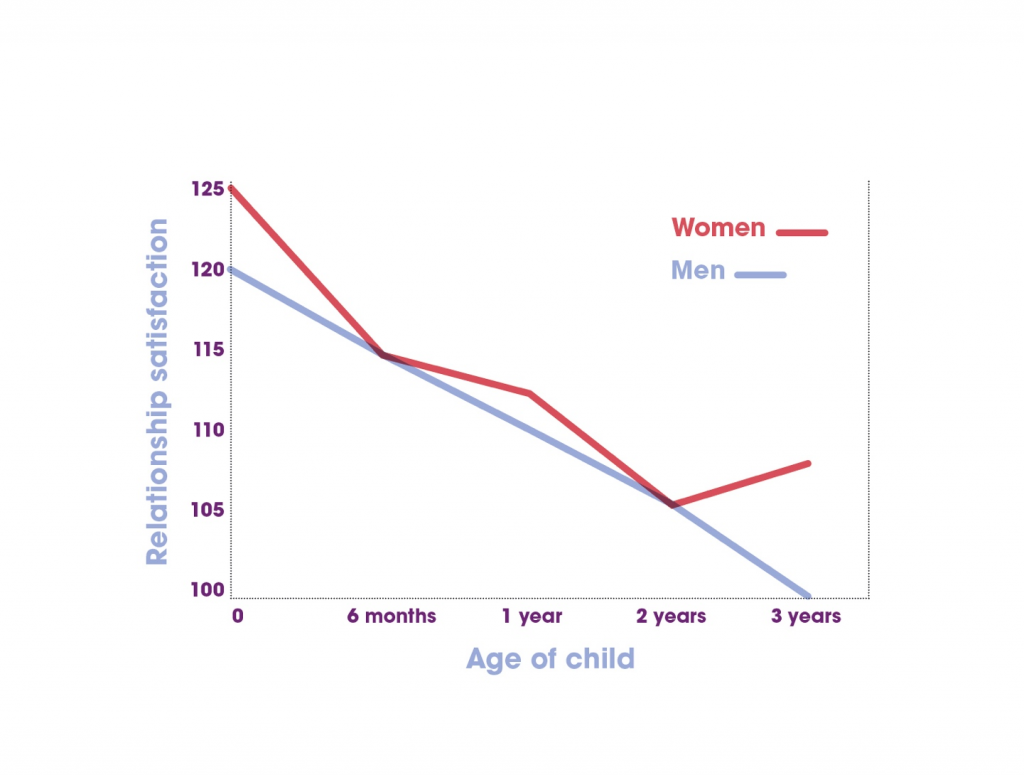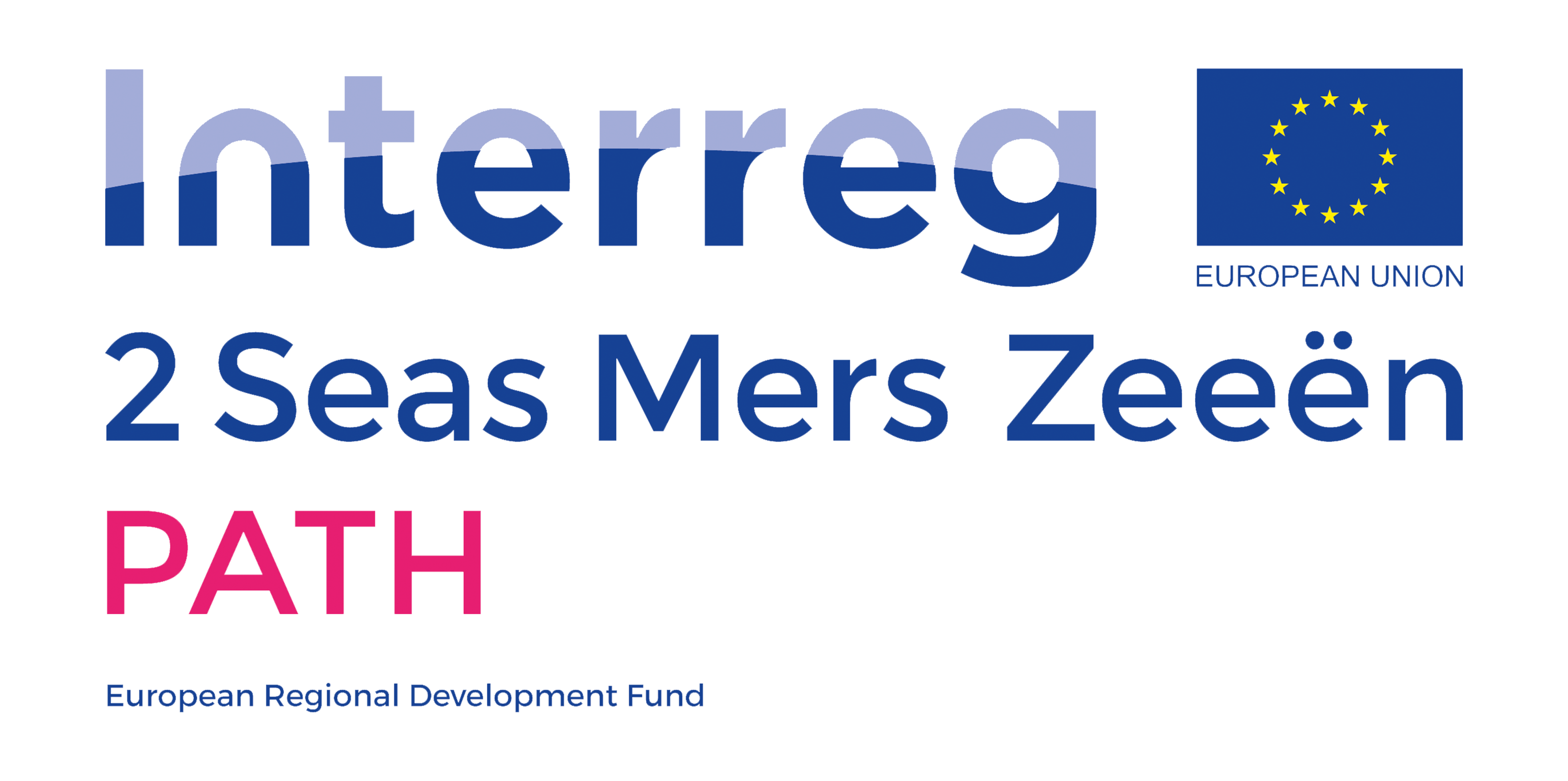When a couple discover they are going to become parents this can have a huge impact on their relationship. Healthcare professionals can do a lot to help couple prepare for these changes and take steps to ‘baby proof’ their relationship. OnePlusOne and The Couple Connection offer a range of courses and resources for professionals and parents to support new and expectant parents with parenthood – see links in the resources section below.
Research by Hirschberger (et all 2009) show that relationship satisfaction can decline after having a baby and dads experience a greater decline than women as the graph below indicates. Only 18-33% of couples report an improved relationship (Gottman et al, 2010; Cowan & Cowan, 1995; Belsky & Kelly, 1994) The rest experience relationship satisfaction decline which often never recovers (Doss et al, 2008; Lawrence et al, 2008) Twenge, 2003)

Hirschberger, G., Srivastava, S., Marsh, P., Cowan, C., & Cowan, P. (2009). Attachment, marital satisfaction, and divorce during the first fifteen years of parenthood. Personal Relationships, 16(3), 401–420.
Preparing couples for the changes that can occur in their relationship is helpful – ideally this is best done antenatally. It is good to get couples to think about how they think their relationship may affect their baby. Couples may have spent time thinking about or be anxious about how the baby will impact on their relationship but may not have considered this from the baby’s perspective. It may help couples to know that 92% of couples argue more in the first year of becoming parents. It is an increased time of stress and vulnerability for them. Helping couples think about their conflict style is helpful. Please see the link in the resources section on resolving conflict.
OnePlusOne offer a range of digital courses for professionals as well as dads, expectant and new parents to manage stress and constructively. Please see the links below in the resources section.
Statistics regarding relationship stress after the birth of the first child include:
A recent study by Dr Helen Norman and colleagues (2018) from Manchester University examined the link between domestic duties and partner relationships of more than 13,000 mixed-sex couples, and found a direct correlation between fathers being involved in childcare and long-term relationship stability regardless of other variables such as ethnicity or wealth. Their results showed that relationships are less likely to break down over the long term if dad looks after the baby on his own without mum being there at least a few times a week during the first year. This correlation held true regardless of all other variables such as ethnicity, gender-role attitudes and household income.
Visit the Impact on child development page to read more about the protective factors and benefits for fathers, mothers and the baby if dad is involved in hands on childcare.
As health care professionals it is good to reflect on the following:
1. How does our society support or not the transition to parenthood for fathers, for example?
2. How is becoming a dad affected by the following?
Resources
A short guide to working with co-parents
towerhamlets.gov.uk
Click Relationships is a relationship support website for individuals, families, and couples. The content is a mix of expert content based on evidence, and posts from our community. It is free and anonymous. You can freely subscribe to content and updates
click.clickrelationships.org/home/all-issues/
Becoming a dad
click.clickrelationships.org
The Couple Connection offer a range of free resources to support couple relationships
thecoupleconnection.net
The Couple Connection – becoming a parent
thecoupleconnection.net
The Couple Connection – How to maintain as stable relationship 2021 guide
thecoupleconnection.net
OnePlusOne offer free and paid for content and course for professionals and parents to support new and expectant parents as well as specific content for dads with the changes that occur when you have a baby
oneplusone.org.uk
Relate video – how to argue better
youtube.com/watch?v=n71sjpnvvRc
Relate
relate.org.uk
Resolving conflict by Tony Robbins
tonyrobbins.com
What support is there for dads in your area? How would dads know they are welcome and that services are inclusive of them as well as their partner who has had the baby? What changes can you make?
Visit our supporting fathers page for tools and information on father inclusive practice.
References
Cowan C, Cowan P (1999) When Partners Become Parents: The Big Life Change for Couples. Basic Books, New York
Cowan, P. A., Cowan, C. P., Pruett, M., Pruett, K., and Wong, J.J. (2009). Promoting fathers’ engagement with children: Preventive interventions for low-income families. Journal of Marriage and Family, 71(3), 663-679.
Gottman J, Gottman J (2007) And Baby Makes Three: The six-step plan for preserving marital intimacy and rekindling romance after baby arrives. Crown Publishers, New York
Hirschberger, G., Srivastava, S., Marsh, P., Cowan, C., & Cowan, P. (2009). Attachment, marital satisfaction, and divorce during the first fifteen years of parenthood. Personal Relationships, 16(3), 401–420.
Le Blanc W (1999) Naked Motherhood: Shattering illusions and sharing truths. Random House, New York
Norman, H. Elliott, M & Fagan, C. (2018) Does Fathers’ Involvement in Childcare and Housewwork Affect Couples’ Relationship Stability? Social Science Quarterly, Volume 99 Issue 5 P.1599-1613 Wiley Online https://onlinelibrary.wiley.com/doi/epdf/10.1111/ssqu.12523
Spier D. (2015) Strengthening couple relationships to reduce the risk of perinatal mood and anxiety disorders for parents. Journal of Health Visiting, 3(3), 160-165.
Twenge, J. M., Campbell, W. K., & Foster, C. A. (2003). Parenthood and Marital Satisfaction: A MetaAnalytic Review. Journal of Marriage and Family, 65(3), 574–583
